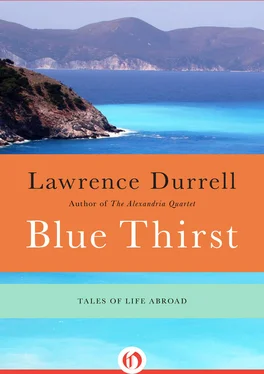
Katsimbalis, the Colossus of Maroussi.

With Miller in California, 1973.
This is the start of a wonderful book. It’s a portrait of Henry Miller and the Colossus of Maroussi setting off for the trip which ended with the book so to speak. The Colossus is a much heavier man now. He was much slimmer then. And that’s Miller. They’re going down the steps of Ghika’s house in Hydra and just about to step aboard the boat and then they disappeared and we saw them much later in Athens after all the adventures which Miller has recorded in his book had taken place. So it’s rather a historic picture. I don’t know whether Miller has a copy of it, I must try and get him one.
That was last year when I came. Considering his bad luck with his operations and with the state of his leg, all the more galling because this is a bicyclist, this is an athlete, you know how humiliating it is if you’re an athlete to have anything wrong with you physically. The amazing thing is that his skull is full of ideas. He’s painting watercolors, he’s writing. He’s now five chapters up on a new book. Even now, after a second and a very long painful operation I’ve never seen such courage and I’ve never seen such optimism. I learn a great deal every time I’m with him. We’re hoping to have a big birthday party on Wednesday when he’s got Anais Nin to come in and so the three Musketeers are going to settle down for a good French evening we hope.
Now this is the growling, bumbling man-mountain Katisimbalis walking around Athens. He’s trying to convince me that I ought to translate Pope Joan and I’m saying, “No. It’s a dirty book.” He has a strong resemblance to two people whom perhaps you might know. If you happen to know the French film actor Raimu, he resembled him so much both in growl and in voice and in general disposition that when Raimu died the Greek press said, “Well, thank God we’ve still got our own version in Mr. Katsimbalis.” But those of you who live here would probably understand better if I say that he is absolutely the image of a wonderful film actor called Sydney Greenstreet who also had a very deep slurring voice and also was rather grumpy and was always a sleuth of some sort or a detective. And indeed when Katsimbalis tried to come here to see Henry Miller he arrived in Los Angeles and went into a bar for a drink and a woman screamed, “Sydney!” and fell in a dead faint. He just caught her before she hit the ground and everyone in the bar was white. He tried to find out what this was about. Apparently Mr. Greenstreet had just died and had been buried that morning and they’d all just come back from his funeral when George walked in. There he is in a more characteristic vein. There he is in France. He’s found the sort of wine that suits him. Very bad influence. Very bad influence.
Now, I don’t know what sort of picture I’ve made, perhaps rather a muddled one of this scrapbook of impressions. It’s so various and the country itself is so rich and so evocative that just to have spent one’s youth there seems to be something that, well, it’s pure gold. And the people who live there echo it too. Their hospitality, their kindness and all of the communities. Indeed, I was thinking of Parga and the little Turkish community. There was one small episode which may perhaps make you smile. In Parga the Americans were marketing a chocolate laxative, called X–Lax, I think, and they had translated their advertising into good Turkish, and the slogan for the advertising campaign was “It works while you sleep.” Now, to the Turkish mind, that something should work while you are actually sleeping seemed absolutely wonderful and the sales of this chocolate probably still go on to this day under this excellent slogan. Well, of course, everyone likes something for nothing. I can think of a thousand more small anecdotes but they don’t really add up to any conclusive sense. What really echoes on in the back of my mind is the place where I was reborn, where I finished the Black Book and was photographed by the British fleet in the state of nudity, that house with its remoteness and the islands going down like soft gongs all the time into the amazing blue, and I shall really never, never ever forget a youth spent there, discovered by accident. It was pure gold. But then of course there may be a little element of self-deception in it because youth does mean happiness, it does mean love, and that’s something you can’t get over.
Propaganda and Impropaganda
I came to diplomacy very late and by accident and through the back door: and had it not been for a sudden war erupting I don’t think I would have ever been interested in it and I don’t think it ever would have accepted me, for neither by birth, nor education, nor upbringing am I the sort of person who might have made the grade as a career diplomat before the war. And even if I had wanted to do it and had tried, I think I would have failed the examinations which were necessarily very hard and I would’ve lost on all counts. But when the war broke out it suddenly became necessary for people who had languages to supplement the relatively inane diplomatic corps which had a great deal of style on the exterior but nothing much inside, and to help disguise the fact that they were full of gingerbread. And so through the orifices of the more modest but really professional consular service they infiltrated a lot of people who knew something. I had the ill luck, or the good luck, in Athens to be taken aboard simply because I knew some Greek at that time: and could write.
It’s not entirely the fault of the diplomatic service that it seems so moribund, which it truthfully is a bit nowadays. There’s always a function for an embassy where you want, for example, to have an intelligent and civilized discussion of fishing rights or to elaborate a new treaty or something like that. But what’s really made diplomacy moribund today is really the telegram and the telephone and the communications set up. Nothing is really more moving, as for example in Government House Cyprus or in any embassy, than the bound file of the reports and dispatches by the ambassador 50, 60, 80 years ago which were all carefully hand-lettered by his scribes, carefully corrected and in numberless copies were then dispatched for distribution. But by the time I reached it these days were over. I was already 12 when I was sent to England, from India it took me a month to communicate with my parents by sea and during the early years there was no air service at all. The air connections started around 1932. When I was in Corfu at the very beginning of the war there was one old sea-plane which engineered the communications with India so that what with post office delays it really took 10 or 15 days for an airmail letter to get to India. Well, you can imagine if you have a very violent situation on your hands as an ambassador has frequently and might have to act and invoke or threaten, you haven’t time to ring up Whitehall about it. Well now Whitehall opens the daily newspaper and rings you up and tells you what to do, so naturally you feel rather on the shelf all the time. But in the old days it was very much up to you to take a decision on the spot and to act and to put up with the consequences if you were in the wrong afterwards. So it gave a backbone to people like Burton and so on. As consular officials and as diplomats were working in an excellent tradition, they felt functionally that their role was an important one. It’s less important today, and with the advent of so much nonsense about spying it’s become increasingly tricky. But relatively speaking I very much admire the old type of diplomat, many of whom I worked under when I was a junior in their embassies, who belonged to the Burton strain and who one could see the relationship with, for example, Sir Thomas Wooton who was probably a friend of Shakespeare (he wrote excellent poetry) and who announced that he had taken Venice for his consulate and when asked what he did said “I lie abroad for my country.” Of course “lying” means also in Elizabethan “I reside abroad”, but the doubletake is there because “lying” also means “lying”, and there was a good element of need at that moment what with the battle between Protestantism and Catholicism on the continent and the Armada approaching and so on, that somebody should have his lies ready in his bag, and good ones.
Читать дальше














